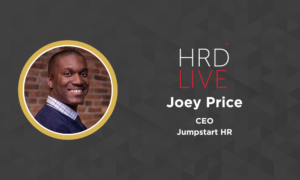MATCH Challenge: Bridging the gap between employee and manager
- 5 Min Read
Chris Kerridge, Employee Engagement Expert, MHR explains how switching from outdated annual appraisals to real-time performance management can not only improve productivity, but strengthen the relationship between employees and line managers.
- Author: Chris Kerridge
- Date published: May 20, 2019
- Categories

At the HRD Summits, we bring business leaders together for MATCH Meetings, where they discuss the greatest challenges facing their organizations, taking in everything from talent acquisition to cultural transformation.
Each week, we take a MATCH Challenge and put it to our community to find the answer. This week’s MATCH solution comes from Chris Kerridge, employee engagement expert, MHR.
MATCH Challenge: Real time performance management – how can businesses bridge the gap between employee and manager?
While the world of work has evolved at a phenomenal pace over the past decade, in many cases management practice and organisational culture have not.
Towards the end of 2017, a YouGov survey commissioned by MHR found that 80% of employees have experienced what they consider poor management, or a poor manager, at least once during their career,
It also found that 73% of employees who have experienced poor management or a poor manager have considered leaving a job and, among these, a staggering 55% actually quitting their job because of bad management.
One of the reasons why poor management practices have become prevalent in the UK workplace is because many organisations continue to rely on formal, rigid processes which are not only outdated but prove only to re-inforce hierarchical structures between ‘boss’ and ‘worker’.
Take the annual appraisal for instance. When appraisals become commonplace in the middle of the 20th century – an annual review of an employee’s performance worked because very little changed in a year. Time was easier to manage too, everyone worked to rigid shift patterns and most worked at the same location every day. Organisations had more managers and managers had assistants so there was plenty of resource to prepare for an annual appraisal event.
For managers an annual appraisal was a way of keeping tabs on its employees and checking what they’ve done over the past year.
Fast forward 50 years and the world of work has become a very different place. Technology exists to manage repeat processes. Jobs are diverse. Employees work on projects, in virtual teams, remotely and their objectives change continuously. No two days are the same.
At a time when organisations are becoming more fluid and flexible in the way they work, the reality is that annual appraisals are no longer fit for purpose.
The new way of managing performance
Forward-thinking organisations are replacing annual appraisals with real-time performance management – a process that saves time, engages employees, and promotes good management practice. In this system, employees receive on-the-spot feedback and coaching from their managers, as and when it’s needed.
This transition represents a major change not only in process, but also in culture. HR professionals, now freed up from the administrative burden of annual appraisals, will be heavily involved in implementing real-time performance management. Here are some key points to consider.
Managing check-ins
In order for this new approach to work, HR departments need to consider how performance check-ins are managed and scheduled, how feedback is recorded, and how to ensure that they actually happen. Thankfully, this has never been easier – HR software packages allow you to manage all aspects of the process, from scheduling check-ins to logging feedback and progress, creating accurate real-time data on your entire workforce.
Preparing managers
Real-time feedback promotes a more hands-on approach to performance management. Managers will need to be equipped with the necessary skills to encourage, coach and mentor their people – and have difficult conversations where necessary. Not all managers have well-honed people management skills, particularly those set in their ways. It will be up to HR to ensure that managers are well prepared for the new era of performance management.
Creating a sense of direction
Creating a set of core values gives your employees something to get behind – a sense of direction, shared goals, and the feeling of being involved in the bigger picture. Real-time feedback helps both employees and managers align their work and goals to these values, promoting employee
engagement and long-term success. HR professionals will be key in driving home an organisation’s mission statement.
Promoting a new culture
It’s time we moved away from unapproachable bosses and intimidating work environments. Real-time feedback promotes a modern, inclusive and collaborative work culture, where employees can approach managers for feedback or advice as and when they need it. Under this system, managers double up as coaches and mentors. This helps steer people and projects in the right direction, treating under performance as something to turn around rather than punish. For this to work, this new way of thinking will have to be applied from top to bottom.
Building a wider HR strategy
Real-time performance management can be seen as part of a wider talent management strategy. Together with succession planning, ongoing training and development, and fresh engagement practices, you’ll build a brand that attracts and retains top talent.
Real-time benefits
This is all common sense. The benefits to real-time performance management are clear:
- If we start engaging employees through effective, real-time feedback, we’ll have a happier, more productive workforce.
- If we eliminate bad management practices, we’ll promote a culture of open communication, bridging the gap between employees and managers.
- If we release HR staff from the administrative burden of annual appraisals, we’ll free them up to engage in forward-thinking HR strategy.
- And we can do all of this while saving time and money.









